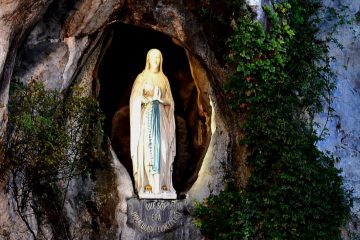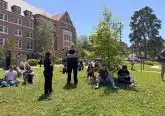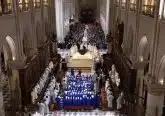Encore: Nevada religious communities unify to magnify the voices of the poor

IMAGE: CNS photo/courtesy Nevadans for the Common Good
By Dennis Sadowski
WASHINGTON (CNS) — Back in 2017 as hundreds of elderly Nevadans were on a waiting list for the Meals on Wheels program, Natalie Eustice and her friends at Nevadans for the Common Good learned the state was spending just 27 cents a meal for the program.
It was the lowest rate in the country — by far — and Eustice, a member of St. Thomas More Parish in Henderson, near Las Vegas, knew it was time for the state to boost funding so the long list could be pared down.
So when the state Legislature, which meets every two years, began considering Nevada’s biennial budget, Eustice agreed to testify on behalf of Nevadans for the Common Good, which had mounted a campaign to build grassroots support. Eustice had two minutes. She told the legislators it was important that Nevada do a better job of supporting seniors so they could maintain their independence.
"It was very scary because I had never done anything like that before," Eustice, now 71, recalled in an interview with Catholic News Service ahead of Poverty Awareness Month, which is observed in January.
Her testimony and the voices of others at the hearing and hundreds more in writing convinced the Legislature and the governor to boost Meals on Wheels funding by $3.4 million. During this year’s four-month legislative session, Nevadans for the Common Good secured an additional 50 cents per meal on top of the funding increase two years earlier.
Meals on Wheels is a nationwide program administered by more than 5,000 local agencies. The cost of a meal varies by state, averaging $6 to $7 to prepare and deliver. How states fund the program also varies. In addition to state allocations, funding can be provided by the federal Community Development Block Grant, federal senior nutrition programs, Medicaid waivers and individual donors, including recipients.
Those kinds of victories buoy Eustice and the hundreds of members of Nevadans for the Common Good spread across southern Nevada.
"It’s a social justice thing," Eustice said of the Nevada organization, which receives funding from the Catholic Campaign for Human Development, the U.S. bishops’ domestic anti-poverty program. "It’s a good feeling when you’re done."
With origins dating to the Great Recession in 2009, Nevadans for the Common Good, or NCG, is a broad interfaith coalition that includes the Diocese of Las Vegas, 10 Catholic parishes, the Las Vegas Catholic Worker, Protestant and Jewish congregations, Muslim mosques, social service agencies and even a labor union.
Beyond seeking support for Meals on Wheels, members have tackled human trafficking, payday lending, education, immigration reform, transportation, housing foreclosures and neighborhood blight in fighting poverty. The U.S. Census Bureau recorded 41.8 million people, about 13.1% of the population, were living in poverty in 2018.
Most importantly, explained Father Bob Stoeckig, vicar general of the Las Vegas Diocese, Nevadans for the Common Good develops community leaders who learn to speak on their own behalf.
"It’s exciting and even heartening to work in determining what are the things that keep this place from being an optimal place for families," he said.
The diocese has been involved in the organization from the start, shortly after a veteran community organizer with the Chicago-based Industrial Areas Foundation asked church officials to take a leading role in building a grassroots organization to address unmet human needs.
"An organizer named Frank Pierson (since retired) visited at the behest of the United Methodist bishops," Father Stoeckig recounted. "He came to see me early on when I was a pastor and was involved in the diocesan social justice office. He said if the Catholics aren’t involved this essentially can’t work. He said, ‘If you don’t want to be involved tell me.’"
Father Stoeckig discussed the idea with then-Las Vegas Bishop Joseph A. Pepe, who quickly supported the diocese’s involvement. Bishop George L. Thomas has continued to support Nevadans for the Common Good, Father Stoeckig said.
By coming together with religious and community groups the organization’s voice is magnified, he explained.
The concerns NCG tackles emerge from core meetings in churches and neighborhoods, a practice in line with Industrial Areas Foundation principles.
"The issues are not dictated from some outside group," Father Stoeckig said. "They’re issues that percolate from the grassroots."
Like the campaign to improve public transportation for military vets seeking treatment at the outlying Veterans Administration facility. Vets in Boulder City, about 26 miles southeast of Las Vegas, faced up to a three-hour one-way ride by bus with narrow transfer windows.
Father Stoeckig and other members of Nevadans for the Common Good studied the problem by getting on the bus themselves with local journalists to document the challenges the vets faced. It led to changes by county officials that saw buses added to the route.
Barbara Paulsen, 75, a retired dietician and a member of Boulder City United Methodist Church, has been involved with NCG for seven years. Her decision to join the group through her church is rooted in the Bible’s call to show mercy and secure justice for struggling people.
"Our outreach should be two-pronged. We should help people because we need to feed them. But at the same time if we only feed them today, we’re not doing what we’re being called to do," she told CNS.
"We’re trying to make systemic change," she added. "It’s the same thing if you give a man a fish, he can eat for a day. If you teach him how to fish, he can eat for a lifetime. It’s not just about bringing about change, it’s about training people and giving them the skills so they can speak for themselves."
Like Paulsen, Robin Collins, regularly attends NCG-convened community meetings to hear what’s on the minds of her neighbors. When participants tell their story of a challenge they face, the group researches it and involves those who will benefit in developing a campaign to address it.
Collins was attracted to NCG’s work on payday lending abuses. Such businesses often target the "unbanked," people who don’t have bank accounts. She said she was shocked to learn that some payday lending customers ended up facing an effective annual interest rate of more than 650%, the result of the compounding effect of multiple loans being taken out to pay back the original loan amount.
Collins said she sympathized with the cycle payday lending clients face. As a struggling single parent even though she was employed, Collins "was one step away from going to get a payday loan myself." Her faith community instead helped her get through her crisis. "I had a supportive community at the church," she said.
Nevadans for the Common Good and other organizations wanted the state to adopt a payday lending database to protect consumers from the debt cycle by limiting the amount borrowers take out and preventing payday lenders from adding illegal fees and fines. In the face of a massive industry lobbying effort, NCG saw the Legislature pass the database law. Legislators have credited the law’s passage to NCG for turning out large numbers of supporters.
"It was really hard. The payday lenders were in full force. It was a tough issue. But it was one that was so important. They were taking advantage of the poorest people," Collins said.
Such successes are what motivate Collins to stay involved in NCG.
"We are supposed to take care of the poor, the widowed and the orphan. Jesus didn’t come to take care of the well. He came to take care of the sick. This is our mission to help people outside of ourselves."
– – –
Editor’s Note: The U.S. Conference of Catholic Bishops and its Catholic Campaign for Human Development has developed activities and reflections for Poverty Awareness Month. They are available online at bit.ly/2E9WRs7.
– – –
Follow Sadowski on Twitter: @DennisSadowski
– – –
Copyright © 2020 Catholic News Service/U.S. Conference of Catholic Bishops. www.catholicnews.com. All rights reserved. Republishing or redistributing of CNS content, including by framing or similar means without prior permission, is prohibited. You may link to stories on our public site. This copy is for your personal, non-commercial use only. To request permission for republishing or redistributing of CNS content, please contact permissions at [email protected].













